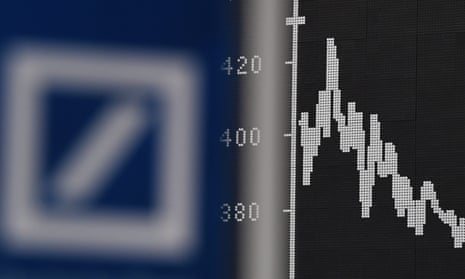Deutsche Bank has been scrambling to reassure investors it has enough cash to pay a multibillion-dollar fine for alleged wrongdoing a decade ago as its shares crumbled to new lows and knocked sentiment across the banking sector.
Shares in Germany’s biggest bank lost more than 7.5% to €10.55 on Monday despite attempts by its senior executives to insist the bank would not need help from Angela Merkel’s government with the potential fine for mis-selling mortgage bonds.
Deutsche, run by Briton John Cryan, had taken a pounding on markets even before the threat earlier this month of a $14bn (£11bn) demand from the US Department of Justice for mis-selling of the bonds between 2005 and 2007.
The shares have more than halved this year on mounting concerns about its financial position. They have dropped to a level not seen since the mid-1980s and are at a record low, according to some calculation methods.
Deutsche’s woes were a focus in the markets when investors were already rattled by the prospect of a “hard Brexit” by the UK – which could be denied access to the EU single market – and the political situation in the US ahead of the debate between presidential candidates Donald Trump and Hillary Clinton.
The FTSE 100 index dropped 1.3% – its biggest one-day fall since the immediate aftermath of the 23 June referendum – with shares in just seven companies up on the day.
Banks’ shares were down, including Lloyds Banking Group, Barclays and Royal Bank of Scotland, which is awaiting settlement talks with the US authorities along similar lines to those in which Deutsche is embroiled. Some analysts warn RBS, which is 73% owned by taxpayers, could face a £9bn penalty.
“Talk of a hard Brexit has not been welcomed by the market,” said Nicholas Hyett, equity analyst at financial firm Hargreaves Lansdown.
In other parts, Europe’s stock markets were also lower and Wall Street was down ahead of the key presidential debate.
Monday’s drop in the Deutsche share price came after Germany’s Focus magazine said Merkel had refused to intervene in the bank’s dispute with the US justice department and that the German chancellor had ruled out state assistance before the national election in September 2017.
Jörg Eigendorf, head of communications at Deutsche, told CNBC: “[At] no point [in] time has John Cryan asked the chancellor for support in the negotiations with the Department of Justice and he doesn’t intend to do that. He’s very strong in that position.”
Asked whether Deutsche needed to raise capital – the fine is around 80% of its stock market value – Eigendorf said: “This is just not a question for us right now. We fulfil the capital requirements. We have time to fulfil future capital requirements and that’s what we are working on.”
The potential penalty from the DoJ – which Deutsche is contesting – is more than twice the €5.5bn (£4.8bn) that the bank has set aside for litigation costs.
Even a fine some way below the £11bn demanded could strain Deutsche’s fragile finances and further dent investor confidence. It faces other potentially expensive inquiries into alleged currency manipulation, precious metals trading and billions of dollars of funds transferred out of Russia.
Steffen Seibert, Merkel’s spokesman, also tried to play down the situation facing Deutsche. “There is no reason for such speculation as presented there and the federal government doesn’t engage in such speculation,” he said.
Deutsche’s shares have been under pressure since early this year when the bank became the focal point of fears over European banking’s financial strength and profitability. In June, the International Monetary Fund said Deutsche was a bigger risk to the global financial system than any other bank because of its intertwined relationships with other international lenders.
One investor expressed doubts about whether Germany would really stand aside. Andreas Utermann, chief investment officer of Allianz Global Investors, told Bloomberg television: “I don’t buy at all what’s coming out of Germany in terms of Germany not wanting to step in ultimately if Deutsche Bank was really in trouble ... It’s too important for the German economy.”
